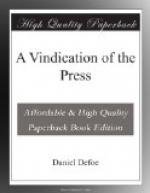The general homeliness and facility of the style, together with characteristic phrases which occur in his other writings, indicate Defoe’s hand. Likewise homely similitudes and comparisons, specific parallels with his known work, and characteristic treatment of matter familiar in his other works, all furnish evidence of his authorship of this pamphlet.
Just what motive caused Defoe to write A Vindication of the Press is not clear. Unlike his earlier An Essay on the Regulation of the Press (1704), A Vindication does not seem to have been occasioned by a specific situation, and in it Defoe is not alone concerned with freedom of the press, but writes on a more general and discursive level. His opening paragraph states that “The very great Clamour against some late Performances of Authorship, and the unprecedented Criticisms introduc’d” make such an essay as he writes “absolutely necessary.” Yet there is no clear indication of just what works occasion this necessity. The ironic reference to Mr. Dennis at the end of the first paragraph, taken together with the praise of Mr. Pope’s translation of Homer and the allusion to “the malicious and violent Criticisms of a certain Gentleman in its Disfavour” [p. 23], might suggest that Defoe had in mind Dennis’ Remarks upon Mr. Pope’s Translation of Homer, but even the entire body of writings attacking Pope’s Homer would hardly seem sufficient to give point to this somewhat omnibus and unfocused essay.
Equally suggestive, perhaps, are Defoe’s references to the Bangorian controversy and to Bishop Hoadley [pp. 10, 23]. This controversy raged from 1717 to 1720 and produced a spate of pamphlets (to which Defoe contributed), many of which were marked by heated argument and acrimony. Defoe, with his liking for moderation, no doubt intended to make an oblique criticism of the license of many of the Bangorian tracts. But these tracts are certainly not advanced as the prime occasion for A Vindication.
Defoe points out in the first section of his essay how important is freedom of the press as the foundation of the “valuable liberties” of Englishmen. I have been unable to find any reference to a specific threat of regulation of the press at this time that might have occasioned A Vindication. Nevertheless, it is possible that sentiment for control of the press, perhaps incited by the Bangorian controversy, was felt in 1718 and may have been a contributing motive to the composition of this tract. Whatever the immediate motives for writing it may have been, the variety of its contents suggests that Defoe saw an opportunity to turn a penny, to express himself on a number of his pet subjects, and to defend his own position as a professional writer.




